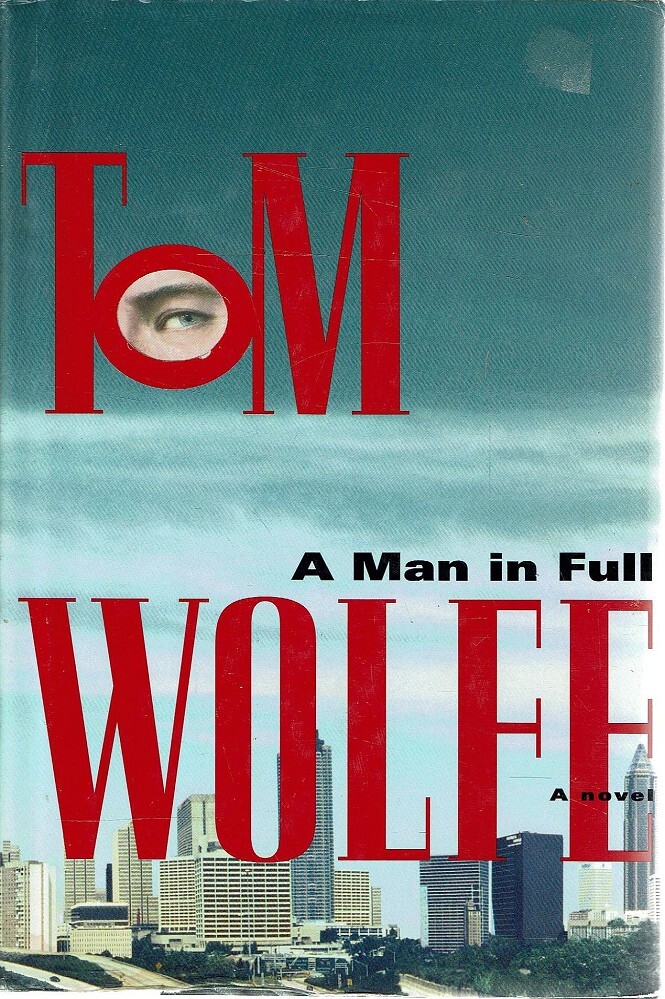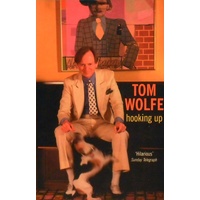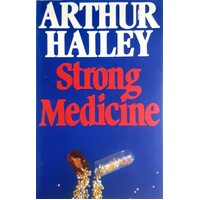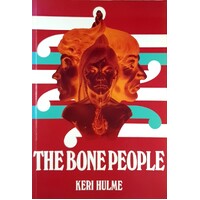A Man In Full
Wolfe Tom
Notify me when back in stock
Cover Type: Hardcover
Book Condition: Very Good
Jacket Condition: Very Good
Publisher: Bantam Books
Publisher Place: United States
Publisher Year: 1998
Edition: First Edition
Description: 742 pages. Book and Jacket are both in Very good condition throughout.
Publishers Description: Before THE BONFIRE OF THE VANITIES, the literary question of the day was, Could Tom Wolfe, the self-proclaimed avatar of the New Journalism, write fiction? After BONFIRE, that question quickly became, Yeah, but can he do it again? Delayed by a number of false starts, revisions, and in 1996, a heart attack and subsequent quintuple bypass surger The Barnes & Noble Review Before THE BONFIRE OF THE VANITIES, the literary question of the day was, Could Tom Wolfe, the self-proclaimed avatar of the New Journalism, write fiction? After BONFIRE, that question quickly became, Yeah, but can he do it again? Delayed by a number of false starts, revisions, and in 1996, a heart attack and subsequent quintuple bypass surgery, the publication of A MAN IN FULL marks Wolfe's return to the literary arena after more than a decade of conspicuous absence. A MAN IN FULL is a sprawling novel of Dickensian proportions and scope, a philosophical exploration of modern manhood, fin de siècle morality, political gamesmanship, and racial identity, all informed by the underlying themes of reinvention and rebirth. Gone are the era-encapsulating catch phrases of his previous books — there's no "radical chic," no "right stuff," no "me decade," or "masters of the universe" to be found here. Instead, Wolfe has devoted his considerable talents to grounding his fiction firmly in journalistic fact, and to addressing one of the most substantial criticisms leveled at BONFIRE — that its characters were little more than cardboard cutouts, one-dimensional caricatures artfully arranged in a variety of strategic postures. In the central protagonists of A MAN IN FULL, Charlie Croker, Conrad Hensley, and Roger White, Wolfe has created memorable characters that rise above stereotypes — thinking, feeling characters that surprise even themselves in pursuing the possibilities open to them. The bulk of Wolfe's novel takes place in the de facto capitol of theNewSouth, and what better place to set a novel of rebirth than Atlanta? Twice rebuilt from the ashes of devastating conflagrations (a phoenix figures prominently in the city seal), Atlanta has a pragmatic history of remaking itself to suit the shifting allegiances of industry and social makeup. Not a "true Southern city like Savannah, Charleston, or Richmond," Atlanta's crass commercial heritage uniquely qualifies it for the role Wolfe has in mind. It is here that Charlie Croker, a former Georgia Tech football star known as the Sixty-Minute Man, has parlayed his gridiron fame into a vast real-estate empire. A formidable figure who, at 60, still considers himself connected to the "rude animal vitality of his youth," Charlie may not be a master of the universe, but he is certainly master of a domain that includes a 29,000-acre plantation in southwestern Georgia named Turpmtine (pronounced "T,u,r,p,m,t,i,n,e" — in the manner of the 19th-century slaves who produced the plantation's original product), a palatial home in Buckhead, an opulently appointed Gulfstream Five jet, and the underleased, overfinanced office tower in one of Atlanta's "edge cities" known as Croker Concourse. As the result of overextending himself to erect this massive boondoggle, Charlie finds himself in default to his creditors to the sum of $750 million. His largest creditor, PlannersBanc, is the first to welcome him to the sober '90s with the news that it's the "morning after...and Croker Global's got the biggest hangover in the history of debt defalcation in the Southeastern Yew-nited States." In the brilliantly executed chapter that follows, Charlie and Croker Global are given a humiliating "workout" by the bank's aptly named Real Estate Asset Management Department (REAMD) for gross mismanagement of funds. (Trust Wolfe to ferret out the one interesting aspect of banking and to portray it convincingly.) Faced with the prospect of losing his beloved Turpmtine, not to mention his Gee-Five and the $7 million personal dividend he reaps from the company each year, Charlie does what any beleaguered capitalist would do — he lays off workers in Croker Global's underperforming food division. On the opposite side of the country, this arbitrary decision results in the swift and utter disfranchisement of Conrad Hensley, 23-year-old husband and father of two. Responsible, conscientious, and painfully naïve, Conrad dreams of attaining the bourgeois life he read about during his brief career in Community College. "Order, moral rectitude, courtesy, co-operation, education, financial success, comfort, respectability, pride in one's offspring, and, above all, domestic tranquillity" are his ideals. The bewildering descent from a body-and-soul killing job in the Croker Global Freezer Warehouse to his fateful confrontation with the authorities — a series of missteps that begins with a degrading job interview, progresses to his car being wrongfully impounded, and ends with Conrad doing jailtime for aggravated assault in the Santa Rita Correctional Facility — is a haunting evocation of the powerlessness and humiliation of life at rock bottom. Wolfe memorably satirizes this manifestation of Reagan-era "trickle-down" economics in an episode where Conrad is treated to a jailhouse baptism by "pizzooka." (If you can't summon up an appropriate mental image of this process, you're just not trying.) Only the timely arrival of a book of Stoic philosophy (Conrad had requested a bestselling legal procedural titled THE STOIC'S GAME, and instead received a copy of THE STOICS) and the nearly incoherent reassurances of his Hawaiian cellmate, Five-O, keep him going. Meanwhile, back in Atlanta, the novel's racially charged subplot is beginning to simmer. Roger White II, a successful black attorney (he cannot yet bring himself to embrace Jesse Jackson's coinage, "African-American"), has been summoned to the Buckhead manor of Georgia Tech football coach Buck McNutter to deffuse a potentially explosive incident: The daughter of one of Atlanta's most powerful (white) businessmen has privately accused Georgia Tech's star running back, Fareek "The Cannon" Fannon, of date-raping her during Freaknic weekend. Roger, a light-skinned blueblood whose tastes run to Stravinsky and bespoke suits (his detested nickname is Roger "Too" White), is given the unenviable task of approaching his childhood friend and fellow Morehouse Man Wes Jordan — now mayor of Atlanta — for help in containing the situation. But Andreé Fleet, a "blacker-than-thou" opportunist who rails against the complicity of "beige half-brothers" and bluntly proclaims that it is "high time Atlanta had its first...BLACK MAYOR," seeks to exploit Fannon's predicament for his own political ends. And unless Roger and Wes can enlist an unlikely ally from Atlanta's white elite, the city is certain to erupt along its racial fault lines. How Wolfe joins these three major plot lines, along with an assortment of minor, but no less captivating threads, is nothing less than astonishing. Those who may find the quasi-religious elements of the denouement a bit far-fetched need only consider the rapid growth and alarming influence of certain less palatable "philosophies" such as the Church of Scientology to see how plausible Wolfe's conceit really is. An inveterate cultural beachcomber, Wolfe sometimes goes too far — and other times not far enough — in spiking his narrative with his latest pop discoveries. His attempts at rap lyrics are predictably hilarious, and in all fairness, he may well have intended them to be. What else could explain a "Country Metal" band named "The Pus Casserole"? Puns on the order of a faithful black retainer referred to as "Auntie Bella," or a law firm called "Wringer Fleasom & Tick" fare better. A fussily dressed 68-year-old white guy can be forgiven, perhaps, for rhyming "akimbo" with "bimbo," but was it really necessary to use it four times over the course of the book? (Novelists take note: One "akimbo" per book, please.) Wolfe has always had a fascination with physical appearances, not least his own. But in A MAN IN FULL, physiognomy has become an obsession. Not a chapter elapses without a thorough cataloguing of bodily attributes. The constant carnal barrage of mesomorphs, endomorphs, stringy-necked jogging junkies, slim-hipped trophy wives, thick-torsoed jowly matrons, broad shoulders, massive necks, prodigious forearms, and loamy loins — nearly forgot the mantra, "boys with breasts" — takes a wearying toll after 700 pages. Similarly, what are we to make of the constant transliteration of Charlie's cracker dialect? These parentheticals are certainly useful for deciphering jailhouse gang-slang and Five-O's mystifying pidgin, but surely the one lasting contribution of the Carter presidency is that most of us are able to recognize a Georgia accent! Lastly, is there anyone on this planet — not born into a New Guinea cargo cult — who needs Tom Wolfe to explain the iconography of Michael Jackson and his trademark glove? These are minor complaints in a novel of this complexity and wit, noticeable only because so much of Wolfe's eavesdropping is spot on. There isn't a wrong note in the dynamic between Roger White and Wes Jordan — black elitists learning late in their careers the political value of nurturing the African American within. The minutely choreographed interplay between Atlanta's movers and shakers at the opening of a homoerotic art exhibit is a dramatic marvel. And however painful, Wolfe's depiction of the social invisibility endured by the discarded first wives of corporate captains like Charlie Croker has the ugly sting of truth. But then, like an impish Puck holding up a mirror to all humanity, Wolfe has made a career of showing us our ugly truths. —Greg Marrs ...more
ISBN: 9780553111644
(180432)















